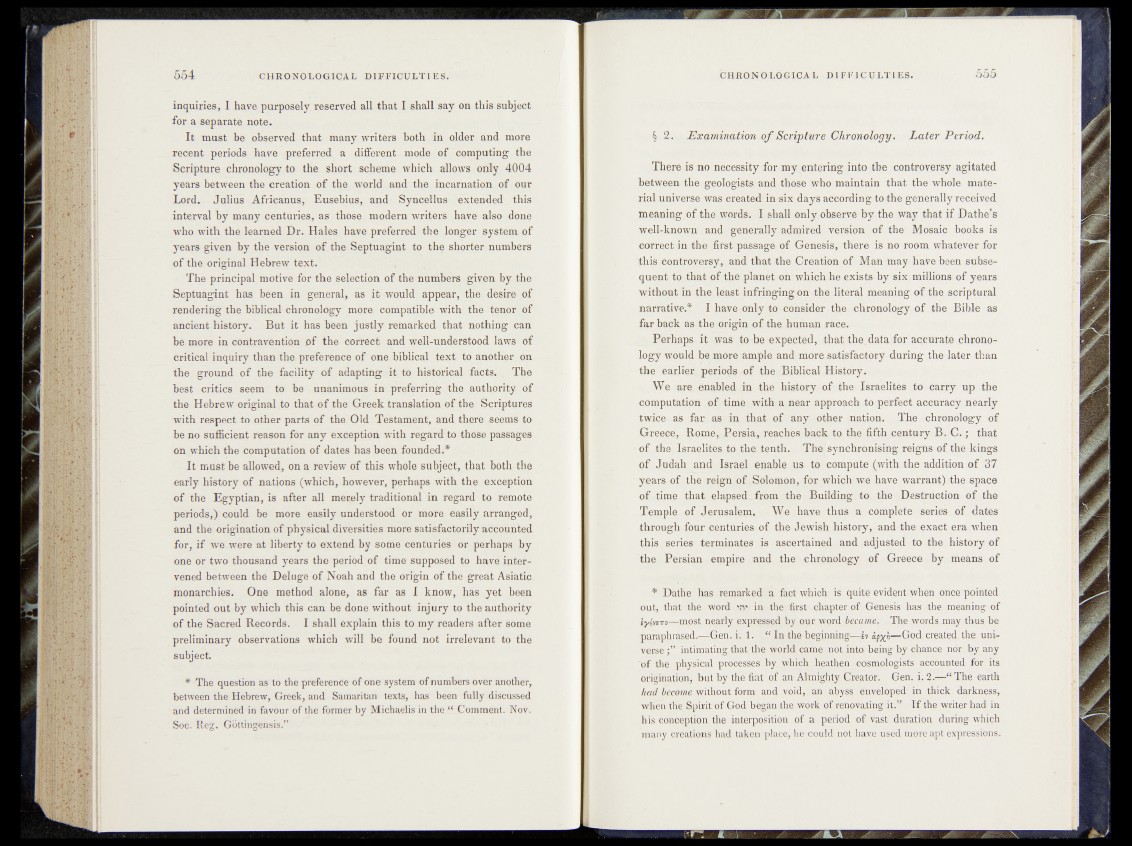
inquiries, I have purposely, reserved all that I-shall say on this subject
for a separate note.
It must he observed that many writers both in older and more
recent periods have preferred a different mode of computing the
Scripture chronology to the short scheme which allows only 4004
years between the creation of the world and the incarnation of opr
Lord. Julius Africanus, Eusebius, and Syncellus extended this
interval by many centuries, as those modern writers have also done
who with the learned Dr. Hales have preferred the longer system, of
years given by the version of the Septuagint to the shorter numbers
of the original Hebrew text.' .
The principal motive for the selection of the numbers given by the
Septuagint has been in general, as it would appear, the desire of
rendering the biblical chronology more compatible with the tenor of
ancient history. But it has been justly remarked that nothing can
be more in contravention^ of the correct and well-understood laws of
critical inquiry than the preference of one biblical text to another on.
tbe ground of the facility of adaptingjit to historical facts. / The
best critics seem to be unanimous in preferring the authority- of
the Hebrew original to that of the Greek translation of the .Scriptures
with respect to other parts of the Old Testament, and there seems to
be no sufficient reason for any exception with regard to those passages
on which the computation of dates has been founded.*
It must be allowed, on a review of this whole subject, that both the
early history of nations (which, however, perhaps with the exception
of the Egyptian, is after all merely traditional in regard to remote
periods,) could be more easily understood or more easily arranged,
and the origination of physical diversities more satisfactorily accounted
for, if we were at liberty to extend by some centuries or perhaps by
one or two thousand years the period of time supposed to have intervened
between the Deluge of Noah and the origin of the great Asiatic
monarchies. One method alone, as far as I know, has yet been
pointed out by which this can be done without injury to the authority
of the Sacred Records. I shall explain this to my readers after some
preliminary observations which will be found not irrelevant to the
subject.
* The question as to the preference of one system of numbers over another,
between the Hebrew, Greek, and Samaritan texts, has been fully discussed
and determined in favour of the former by Michaelis in the ^Comment. Nov.
Soc. Reg. Gottingensis.” .
, §$ 2. Examination o f Scripture Chronology * L a te r Period.
There is no necessity for my entering into the controversy agitated
between the geologists and those who maintain that the whole material
universe was created in-six days according to the generally received
meaning of the words;|%-shall only observe by the way that if Dathe’s
well-known and' generally admired version of the Mosaic books is
correct in the first passage of Genesis, there is no room whatever for
this controversy, and that the Creation of Man may have been subsequent
to that of the planet on which he exists by six millions of years
without in the least infringing on the literal meaning,of the scriptural
narrative.* I have only to consider the chronology «of the Bible as
far back as the origin of; the human race.
Perhaps it was to be expected, that the, data for accurate chronology
would be' more ample and more satisfactory during the later than
the earlier periods of the Biblical History. -
We are. enabled in the history of the Israelites to carry up the
computation of time with a near approach to perfect accuracy nearly
twice. as far as in that of any other nation. The chronology of
Greece, Rome, Persia, reaches hack tb the fifth century B..;Q. ; that
of the-Israelites to the tenth. The'synchronising reigns ©f the kings
of Judah and Israel enable us to’compute (with the addition of 37
years ©f the reign of Solomon, for which we have warrant) the space
of time that elapsed, from the Building to the Destruction of the
Temple of Jerusalem. We have thus a complete series of dates
through four centuries of the Jewish history, and the exact era when
this series terminates is ascertained and adjusted to the history of
the Persian empire and the chronology of -Greece by means of
* Dathe has remarked a fact which is quite évident When bnp® pointed
out, that thé word w in. the first chapter, of »Genesis has the meaning .of
lysviTa—most nearly, expressed by our .word, becam e. The .wards, may - thus be
paraphrased.—Gen. i. 1. “ In the beginning—*» —God created the universe
intimating that the- w'oidd, came-.not. into being by;-chance nor by any
"of the physical processes,by whiçh.heathen costitologists accounted for its
origination, bat by the fiat of"an Almighty Creator., G.eii. i. 2.—“ The earth
h a d become without form and void, an abyss,, enveloped' in thick darkness,
when the Spirit of God began the work of renovating it.” If the writer had in
his conception the interposition of a ^period of vast duration during which
many creations had< taken place, he could not have usedmöre apt expressions.